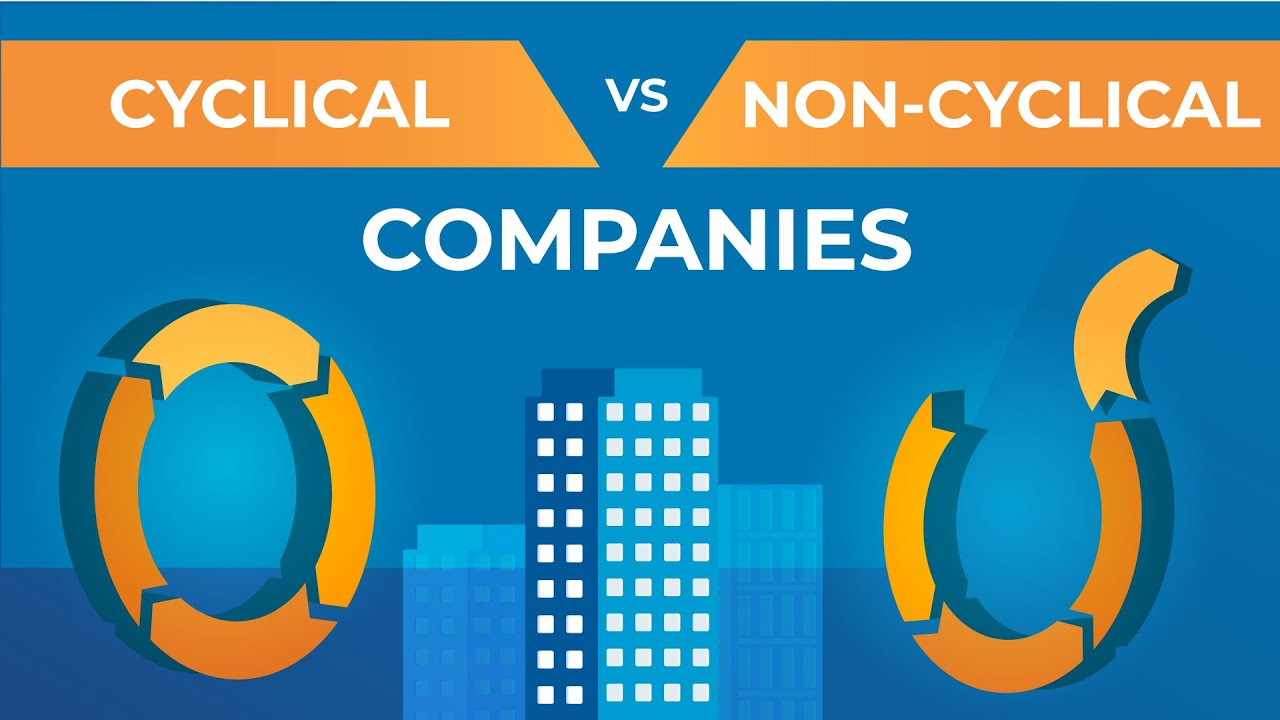
Investing can be a great way to grow your wealth over time. However, building a balanced investment portfolio requires time, effort, and adequate research.
One of the fundamental principles of successful portfolio management is practicing proper risk mitigation through diversification. And while there are various strategies used by investors to limit their risk, the inclusion of non-cyclical stocks in one’s portfolio is one of the simplest yet most effective ways to protect oneself. Such stocks offer a high degree of security and can lower the volatility of investments, particularly in challenging economic conditions.
In this article, we’ll take a closer look at the benefits of including non-cyclical stocks in your portfolio and how you can properly discern between both cyclical and non-cyclical investments.
Whether you’re a seasoned investor or just starting out, understanding the role of non-cyclical equities in your portfolio can help you build a more balanced and successful investment strategy.
What Are Non-Cyclical Stocks?
Non-cyclical stocks are companies whose products and services see consistent demand regardless of economic cycles.
In other words, non-cyclical stocks (also called consumer cyclical stocks or defensive stocks) provide essential items and services that consumers have to buy regardless of economic downturns or disruptions to the business cycle. Products such as toilet paper or medications are good examples of essential items that enjoy consistent demand year-round.
These stocks tend to outperform their counterparts of cyclical stocks in times of economic uncertainty and provide investors with a more stable investment option, as their stock prices don’t experience bouts of volatility during economic fluctuations.
Successful investors typically have at least a portion of their portfolios focused on such companies based on their protection, reduced volatility, and ability to provide investment returns during an economic downturn.
Though these defensive stocks offer reduced volatility for investors, their ability to grow substantially can be somewhat limited, making them an investment option that usually underperforms during times of economic growth.
Herein lies the trade-off for investing in non-cyclical stocks. They provide great protection for investors during an economic slowdown; however, they also offer limited upside for investors who are willing to withstand market volatility.
Examples of Non-Cyclical Stocks
When it comes to non-cyclical stocks, there are many companies and industries to choose from. These stocks can provide a steady stream of income and may be particularly appealing to investors looking for stability and security in their portfolios.
Here are some examples of non-cyclical stocks that investors may want to consider:
Procter & Gamble (PG)
Procter & Gamble is a consumer staples company that produces a wide range of products, including household and personal care items. These products are essential for everyday life and tend to be in demand regardless of the state of the economy. This makes Procter & Gamble a reliable option for investors looking for well-established non-cyclical businesses.
Johnson & Johnson (JNJ)

Johnson & Johnson is a healthcare company that produces medical devices, pharmaceuticals, and consumer health products. The healthcare industry is generally considered non-cyclical, as people will always need medical care regardless of the state of the economy.
American Water Works Company (AWK)
American Water Works Company is a utility firm offering water and wastewater services to its customers throughout the United States. Since the demand for water and electricity remains steady irrespective of economic growth, utility companies are typically viewed as non-cyclical.
Verizon Communications Inc. (VZ)
Verizon is a telecommunications giant that delivers wired and wireless communication services to customers across the globe. The telecommunications industry is commonly regarded as non-cyclical, as these services are essential for both personal and professional purposes, making it a reliable investment option for investors seeking the safety of non-cyclical investments.
Waste Management Inc. (WM)
Waste Management provides waste management services to residential, commercial, and industrial customers in the United States and Canada. Consumers and businesses will always produce waste, giving Waste Management an extremely resilient and steady business model.
NextEra Energy Inc. (NEE)
NextEra Energy is a utility company that provides electricity and energy services to customers in the United States. The company generates electricity through a mix of renewable and traditional sources. Further, NextEra makes a compelling investment, as investors get the benefit of a non-cyclical business that is also capitalizing on the sustainable energy movement.
Coca-Cola Company (KO)

Coca-Cola is a beverage company that produces and distributes non-alcoholic beverages such as soda, water, juice, and energy drinks. The popularity and brand recognition Coca-Cola has allows them to enjoy consistent demand for their products around the world, regardless of economic conditions.
Walmart Inc. (WMT)
Walmart offers a wide array of both essential goods, as well as cheaper consumer discretionary products that tend to see consistent demand throughout economic cycles. Discount retailers like Walmart tend to perform well during economic downturns as consumers shift towards lower-priced options.
Public Storage Inc. (PSA)
Public Storage is a real estate investment trust (REIT) that operates self-storage facilities across the United States. Self-storage facilities are often considered non-cyclical since they provide essential storage services for individuals and businesses regardless of the business cycle. Public Storage has a long history of stable dividends and may be a good option for investors looking for a steady stream of income from their investments.
Cyclical vs. Non-Cyclical Stocks
When building a well-diversified portfolio, it’s important to understand the key differences between cyclical and non-cyclical stocks, as failing to properly understand the nuances between the two categories will undoubtedly lead to investors taking on unknown risk.
Non-Cyclical Stocks
As previously discussed, non-cyclical stocks are companies whose business operations are relatively immune to changes in the economic cycle. These corporations typically provide essential goods and services that people require, irrespective of the state of the economy.
Non-cyclical firms typically exhibit more consistent earnings and cash flows, rendering them a dependable investment avenue during periods of economic instability. As non-cyclical stocks are less reactive to changes in the business cycle, they can provide a safeguard against fluctuations in the broader stock market.
Cyclical Stocks
Conversely, cyclical stocks are those that have business operations that are more susceptible to changes in the economic cycle. Typically, these companies operate in industries that are more reactive to economic conditions, including but not limited to construction, automotive, and travel.
Cyclical stocks generally exhibit superior performance during economic upswings but can endure substantial declines during economic downturns. Due to their heightened susceptibility to business-cycle shifts, cyclical stocks carry greater volatility and risk when compared to non-cyclicals.
How to Determine if a Stock is Non-Cyclical
It is critical for investors to comprehend the attributes of the stocks they’re considering investing in, including their cyclical or non-cyclical nature. While certain stocks are evidently non-cyclical, others may not be as straightforward.
Here are a few essential factors to consider when evaluating whether a stock qualifies as non-cyclical:
Business Model
The first factor to consider when determining if a stock is non-cyclical is the company’s business model. Companies that focus on providing everyday household items to consumers at discounted prices can usually be considered non-cyclical. During economic uncertainty, consumers are more likely to shop at discount retailers than high-scale boutiques. Meaning investors who want to build a protected portfolio should consider investing in businesses whose main value offering is a lower price point compared to the quality of the product.
Earnings Stability
Another factor to consider is the company’s earnings stability. Non-cyclical stocks tend to have more stable earnings and cash flows because their business operations are less affected by changes in the economic cycle. A company with a history of stable earnings (and a consistent dividend) is likely to be a strong non-cyclical investment.
Market Performance
The stock market is often a leading indicator of economic conditions, and non-cyclical stocks tend to perform better during economic downturns when compared to cyclical stocks. During times of economic uncertainty or recession, investors should be able to spot non-cyclical stocks by looking for businesses whose share price has not dropped (or even gained) when compared to their competitors.
Industry Trends
Lastly, it is crucial to assess the general patterns in the industry where the corporation operates. Certain industries, such as healthcare and utilities, demonstrate greater resilience to economic cycles than others. Firms functioning in sectors characterized by stable demand and restricted competition are more likely to be classified as non-cyclical stocks.
It’s important to note that no stock is completely immune to changes in the economic cycle, and even non-cyclical companies may experience some volatility during economic downturns. However, by considering these factors and doing your own research, you can identify non-cyclical stocks that are likely to provide stability and reduced volatility to your investment portfolio.
Who Should Invest in Non-Cyclical Stocks?
Achieving proper diversification across multiple asset classes is crucial for a well-balanced portfolio. When it comes to diversification, non-cyclical stocks can play a vital role, as they offer a range of advantages that make them a valuable addition to any portfolio. For example, they provide stable earnings, robust dividends, and consistent demand, which can help offset volatility and risk associated with other investments.
One of the other key benefits of non-cyclical stocks is their ability to perform well during economic downturns. This makes them an excellent hedge against market turbulence.
In contrast, cyclical stocks may offer significant returns but can also be highly volatile, as their performance is largely dependent on economic conditions. Investors willing to take on additional risk in pursuit of higher yields may consider focusing more on cyclical stocks in their portfolio.
It’s important to note that building a successful investment portfolio requires diversification across different asset classes, including non-cyclical and cyclical stocks, as well as other types of investments like bonds, real estate, and growth stocks. By spreading your investments across assets, you can reduce your overall risk and increase your chances of achieving your investment goals over the long term.
